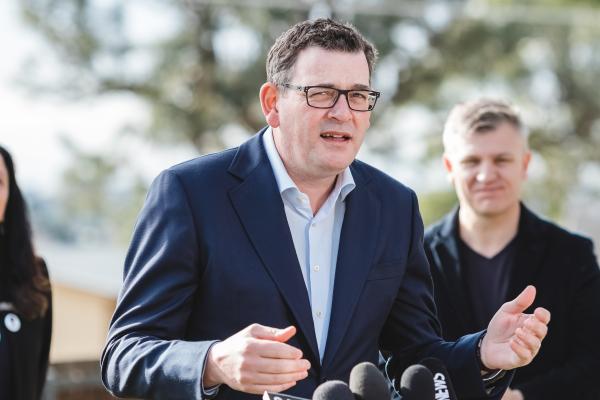Almost all of the remaining restrictions will eased tonight, with the state due to hit its 90 per cent vaccination target this week.
Premier Daniel Andrews announced today the acting chief health officer had determined the state’s vaccination rates meant it was safe to move to Phase D of the national COVID recovery plan.
As of tomorrow, fully vaccinated Victorians will be able to hit the dance floor once again, and caps on visitors to homes and at cafés and restaurants will be lifted.
Masks rules will also be eased.
Masks will still be required for primary school staff and visitors and for students in Years 3 to 6, for workers serving the public at hospitality venues, for workers and customers at indoor retail, for visitors and some workers in hospitals or care facilities, and for people using public transport, taxis, rideshare services and planes.
It is expected shoppers at indoor retail stores will be able to ditch masks from December 15.
All indoor and outdoor events with less than 30,000 fully vaccinated attendees will be able to proceed with no need for special approval and outdoor events with 30,000 or more will only need to publish their COVIDSafe Plan.
Indoor venues – including stadiums that have a capacity of 30,000 or more – will need to get a one-off approval of their COVIDSafe Plan from the Victorian Government.
Major events like the Boxing Day Test and the Australian Open will be able to proceed at full capacity, subject to the approval of the MCG and Melbourne Park’s COVIDSafe Plan.
High-risk work settings such as corrections and meat, poultry and seafood processing will continue to require masks.
There will still be mask requirements, density limits and caps in place for weddings, funerals, places of worship and other settings if the vaccination status of attendees is not being checked.
Non-essential retail settings across Victoria will join the vaccinated economy and will only be open to Victorians who are fully vaccinated, under 12 years and two months, or have a valid exemption.
Self-quarantine obligations will also be reduced across the board for COVID-19 cases and fully-vaccinated contacts.
From tomorrow, the most people who come into contact with a confirmed positive case outside their home won’t have to self-quarantine.
These contacts will instead be required to get a standard (PCR) test and isolate until they get a negative result.
However, the Department of Health will have the power to impose a quarantine period on contacts on a case-by-case basis, depending on evidence.
Cases are required to notify their workplace, school or childcare about their positive result.
Once informed by the case, workplaces will also have to identify and notify employees and sub-contractors, but not customers, who were exposed to advise them to get tested.
Schools and childcare centres will also identify and inform staff and student contacts.
Exposure sites will no longer be published and instead, the department will use the new alert function in the Service Victoria app to notify patrons of higher-risk venues where positive cases have been present and advise them to get tested.
Individuals who test positive will be strongly recommended to tell their social contacts themselves and encourage them to get tested, as the department will not trace the contacts.
Mr Andrews said household contacts who had more than four hours of contact with a case inside a household, accommodation or care setting must isolate for seven days if fully vaccinated or 14 days if not fully vaccinated, with a PCR test required on day 0 and for release.
If children under 12 are household contacts, they will be considered fully vaccinated if everyone else in their household aged over 12 is fully vaccinated.
Workers exposed at work, and children who are exposed at school or early childhood centres, will need to show a negative PCR test result to return to work or school.
In addition to isolation changes for contacts, people who have COVID-19 will be required to isolate for 10 days, instead of 14 days.









